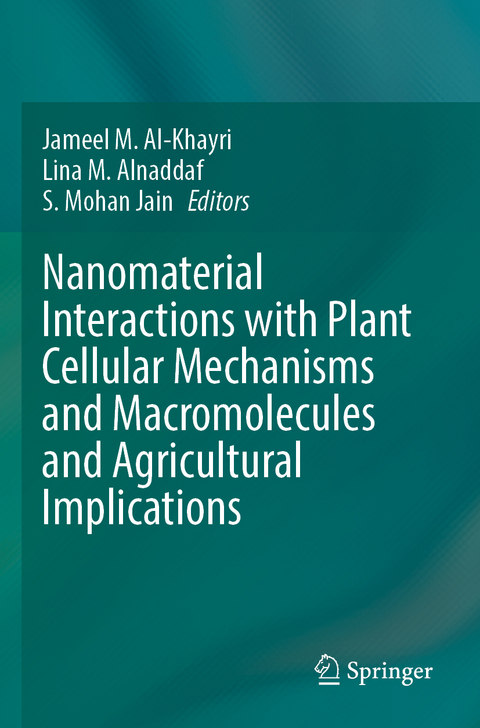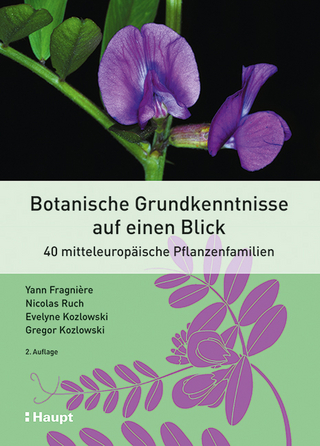
Nanomaterial Interactions with Plant Cellular Mechanisms and Macromolecules and Agricultural Implications
Springer International Publishing (Verlag)
978-3-031-20880-5 (ISBN)
Chapter "Impact of Nanomaterials on Plant Secondary Metabolism" is available open access under a Creative Commons Attribution 4.0 International License via link.springer.com.
Professor Jameel M. Al-Khayri is specialized in plant biotechnology and currently affiliated with the Department of Agricultural Biotechnology, King Faisal University, Saudi Arabia. He received B.S. in Biology in 1984 from the University of Toledo, M.S. in Agronomy in 1988, and Ph.D. in Plant Science in 1991 from the University of Arkansas. He is a member of the International Society for Horticultural Science and Society for In Vitro Biology as well as the national correspondent of the International Association of Plant Tissue Culture and Biotechnology. For the last three decades, he dedicated his research efforts to date palm biotechnology. He has authored 85 articles in refereed journals, 60 chapters, and edited 8 journal special issues. In addition, he edited 30 reference books on biotechnology, genetic resources sustainability, advances in breeding strategies, climate change resilience, nutraceuticals, genetic engineering, genome editing, and nanotechnology published by Springer, CRC, and CABI. He has been involved in organizing international scientific conferences and contributed numerous research presentations. In addition to teaching, students advising, and research, he held administrative responsibilities as the assistant director of Date Palm Research Center, head of Department of Agricultural Biotechnology, and vice dean for Development and Quality Assurance. Dr. Al-Khayri served as a member of Majlis Ash Shura (Saudi Legislative Council) for the 2009-2012 term. Currently, he is maintaining an active research program on date palm focusing in vitro culture, secondary metabolites production, genetic engineering, and mutagenesis to enhance tolerance to abiotic and biotic stress.
Associate Professor Lina M. Alnaddaf is specialized in biotechnology and molecular biology at the Department of Field Crops, College of Agriculture, Albaath University, Syria. She obtained B.S. in Agricultural Engineering in 2001 from Albaath University, M.S. in field crops in 2010, and Ph.D. in field crops in 2013 from Tishreen University. Her research expertise is dedicated to biotechnology, molecular biology, and nanotechnology. She published 23 research articles in international journals in addition to 6 book chapters. She is reviewer for several international journals on biotechnology and agriculture. She participated in the organizing and scientific committees of local and international scientific conferences and contributed numerous research presentations. In addition to teaching, graduate students advising, and conducting funded research projects, currently she is conducting two research projects on biotechnology and nanotechnology focusing on genetic resources for wheat and using nanoparticles in agriculture, medicine, and the environment. She is interested in the role of biotechnology and nanotechnology in enhancing plant breeding and reduced negative impacts on the environment.
Professor Shri Mohan Jain is a consultant and plant biotechnologist, Department of Agricultural Sciences, University of Helsinki, Helsinki, Finland. He received M.Phil. in 1973 and Ph.D. in 1978, Jawaharlal Nehru University, New Delhi, India. He was a postdoctoral fellow in Israel and USA and a visiting scientist/professor in Japan, Malaysia, Germany, and Italy. He was a technical officer, Plant Breeding and Genetics, International Atomic Energy Agency (IAEA), Vienna, Austria, 1999-2005. He is a member of International Association of Plant Tissue Culture and Biotechnology; he is an editorial board member of Euphytica, In Vitro, Propagation of Ornamental Plants, Emirates J. Food and Agriculture, and a series on forest biotechnology. His publications are more than 160 in peer-reviewed journals, book chapters, and conference proceedings and edited 55 books; he was an invited speaker and acted as a chairperson in several international conferences worldwide. He was serving at the International Atomic Energy Agency (IAEA) when
1. Introduction: Impact of Nanotechnology on Plant Cell Biology.- Part I Cellular Mechanisms.- 2. Effect of Nanomaterials on Water and Solutes Translocation in Plants.- 3. Response of Plant Photosynthesis to Nanomaterials.- 4. Impact of Nanomaterials on Chlorophyll Content in Plants.- 5. Interactions of Nanomaterials with Plant Pigments.- 6. Impact of Nanomaterials on Plant Secondary Metabolism.- 7. Toxic Effects of Nanomaterials on Plant Cellular Mechanisms.- Part II Cellular Macromolecules.- 8. Interaction of Nanoparticles with Plant Macromolecules: Carbohydrates and Lipids.- 9. Interaction of Nanomaterials with Plant Macromolecules: Nucleic Acid, Proteins and Hormones.- 10. Influence of Nanomaterials on Non-Enzymatic Antioxidant Defense Activities in Plants.- 11. 2D-Nanosheets Based Hybrid Nanomaterials Interaction with Plants.- Part III Agricultural Implications.- 12. Nanomaterial Impact on Plant Morphology, Physiology and Productivity.- 13. Role of Nanomaterials in Improving CropProductivity.- 14. Role of Nanomaterials in Plant Cell and Tissue Culture.- 15. Role of Nanomaterials in Improving the Nutritional Value of Crops.- 16. Role of Nanomaterials in Improving Crop Tolerance to Abiotic Stress.- 17. Plant Mediation to Tolerate Cadmium Stress with Selenium and Nano-selenium.- 18. Synthesis and Applications of Cellulose Nanomaterials Derived from Agricultural Waste and Byproducts.
| Erscheinungsdatum | 04.01.2024 |
|---|---|
| Zusatzinfo | XV, 507 p. 73 illus., 65 illus. in color. |
| Verlagsort | Cham |
| Sprache | englisch |
| Maße | 155 x 235 mm |
| Gewicht | 784 g |
| Themenwelt | Naturwissenschaften ► Biologie ► Botanik |
| Technik ► Umwelttechnik / Biotechnologie | |
| Schlagworte | Cellular macromolecules • cellular mechanisms • cellular processes • nanomaterials • Plant cellular interactions |
| ISBN-10 | 3-031-20880-3 / 3031208803 |
| ISBN-13 | 978-3-031-20880-5 / 9783031208805 |
| Zustand | Neuware |
| Informationen gemäß Produktsicherheitsverordnung (GPSR) | |
| Haben Sie eine Frage zum Produkt? |
aus dem Bereich


